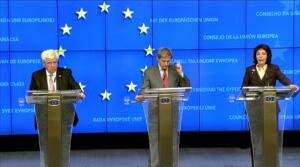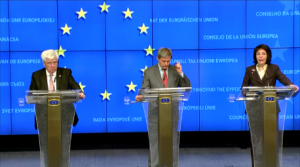Chaired by the Minister of Rural Development and Food, Athanasios Tsaftaris, the Council of Ministers for Agriculture and Fisheries of the EU concluded in Brussels with significant results, particularly in the promotion of agricultural products on the internal market and in third countries. One of the most important priorities for the Greek Presidency has been achieved by reaching this agreement.
Agriculture Council Issues (in the presence of Commissioner Ciolos)
1. Promotion of agricultural products on the internal market and in third countries - Mandate for negotiations for the Greek Presidency.
Regarding the promotion of agricultural products on the internal market and in third countries, significant progress has been made since the Council of Ministers agreed on the key points of the compromise text that was presented by the Presidency. That is, the increased EU financing rate of 75% for all marketing programs and 85 % in cases of crisis required more effort to promote agricultural products.
These rates may be increased by 5 points, thus reaching 80% and 90% respectively, when organizations that operate them are located in countries in financial distress. Additionally, after a meeting of the Special Committee on Agriculture, held yesterday evening along with the Council of Ministers, the Council gave the Presidency the negotiating mandate for carrying out the trilogues with the European Parliament with the presence of the President of the Council of Ministers for Agriculture and Greek Minister, Athanassios Tsaftaris.
These developments, as mentioned by the Commissioner for Agriculture, Dacian Ciolos, at the press conference that followed the Council, show that the aim of the Presidency for reaching a first reading agreement before the recession period of the European Parliament, will be achieved during the Greek Presidency.
2. Organic Farming
The Commission presented to the ministers its proposal for a regulation on organic production and labelling of organic products and a new action plan. The aim of the proposals is to remove the current deficiencies such as the complexity, the unclear provisions, the deficiencies in the control system and in the trade regime, as well as the lack of opportunities for EU producers. Both the current legislation on organic farming and the European organic action plan should be modernised.
The main elements of the new Commission's proposal are the following:
– The production rules are harmonised by removing exceptions, except in very specific circumstances;
– The agricultural ingredients used in the composition of organic processed products have to be exclusively organic;
–Operators other than farmers or operators producing seaweed or aquaculture animals, with the exception of very small enterprises, are required to improve their environmental performance;
– The control system is integrated into a single legislative text aiming to be more effective;
– It is introduced a system of group certification, in favor of the small-scale farmers
– Specific provisions are introduced for purposes of enhanced traceability and fraud prevention;
– Concerning the trade regime, the possibility of equivalence agreements between EU and the third countries remains while the system of unilateral ambivalence is phased out;
The Presidency will proceed to the examination of the legislative proposal in the Council, to approach a good result that will accommodate an agreement to be reached as soon as possible, after the new Parliament undertakes its responsibilities.
3. Fruits and Vegetables Report
A report on the implementation of the provisions relating to producer organizations, operational funds and operational programs in the fruit and vegetables sector presented. The report highlights the weaknesses of the system and results in recommendations for new measures. The report also shows that there has been progress in the field of organization, but other MS have a high degree of organization whereas other low, as it is the case in the southern countries and the new Member States. The Greek Presidency will examine the report, in order to reach useful conclusions on strengthening the role of producer organizations in countries that are lagging behind.
4. Status of the dairy sector in the EU, after the expiry of quotas in cow's milk in April 2015
Given the significant and rapid developments in the sector, both internationally and within the EU, and requests from many members of the Council, the Greek Presidency suggested the above mentioned item for the third time in the agenda of the Council.
The Agriculture Council discussed the state and prospects of the dairy sector as well as the management of potential crisis in the countries of the EU, after the expiry of quotas in 2015. This is an event that is expected to bring upheavals in the European market and the conditions for "soft landing" measures were examined. The views of Member States on this important issue are diverse and the issue remains open for further discussion at future Councils of Ministers, after the European Commission will have presented all updated information, the expected changes, as well as suggestions for possible ways to prevent and deal with problems that may arise in the various member states. However, the request by some countries for an early abolition of quotas was not accepted by the majority of the Member States and the European Commission.
5. Problems in rice imports from third countries into the EU
The Council also discussed the rice sector and the difficulties of the European rice market due to imports from third, less developed countries. The request of Italy - both in its first request and the current - was supported by Greece and the delegations of Spain, Portugal and Bulgaria as well. Commissioner Ciolos pledged to closely monitor the market and, if necessary, to be ready to act in order to avoid any major crisis and to defend the interests of European industry.
6. Update on trade negotiations between the EU and Third Countries
During the lunch of the Ministers of Agriculture, the Greek Minister Tsaftaris requested Commissioner Ciolos and the European Commission to provide detailed information to the Member States on the state of negotiations with third countries such as Canada, the U.S., and Singapore etc., and cooperation with other countries.
The discussion was particularly interesting, since the Directorate General for Agriculture and Rural Development is advising the Directorate which is responsible for the Foreign Trade negotiations on agricultural products included in the list of issues for the negotiations.
The Minister, as President of the Council, stressed that: “safeguarding and ensuring the quality of European agricultural products with designation of origin or geographical indications, trademarks of quality, is for the Greek Presidency but also for Greece, as a Member State, a consistent and constant priority. The same goes for the EU as a whole. It is for this reason, that the scheme was established and the introduction of three further designations is expected as well. This is the central strategy of the EU agriculture: Quality Branded Foods. This is a EU central policy as mentioned in the CAP, on which negotiations for International Trade Agreements should be based.
B. Public health issues (in the presence of Commissioner Borg)
Mandatory indication of the country of origin or place of provenance for meat used as an ingredient in foods
The Council held a debate on the report submitted by the Commission regarding the indication of the country of origin or place of provenance for meat used as an ingredient. The debate was based on the three scenarios assessed by the report on the possibility to extend mandatory indication of the country of origin or place of provenance. The discussion in the Council highlighted the existence of diverging views among Member States. The basic elements that were highlighted are the operational costs for the Food Business Operators, the consumer ‘willingness to pay’ the cost such labeling involves, the existence of reliable methods/techniques of traceability etc. In this context, regarding the various technical issues raised and in order to examine further the views of Member States, the Greek Presidency will tackle this issue and examine it further in the Council’s preparatory bodies.
C. Fisheries Issues (in the presence of Commissioner Mrs Damanaki)
- Adoption of the Council implementing decision for the listing of non-cooperating third countries in the fight against illegal, unreported and unregulated fishing in the context of the IUU Regulation.
The Council adopted in unanimity and for the first time, an implementing decision for the listing of three countries (Guinea, Cambodia, Belize) as non-cooperating in the fight against illegal, unreported and unregulated fishing. With the entry into force of this decision, imports to the European Union of fisheries products caught by vessels cooperating with those countries will be banned.
- Consultations of the Coastal States for mackerel and EU/Norway bilateral consultations
The European Commission reported back to Council on the outcome of the consultations of Coastal States for the North-East Atlantic mackerel, for which the Commission reached a trilateral agreement (EU, Norway and Faroe Islands).
Read more on the Council's website.










